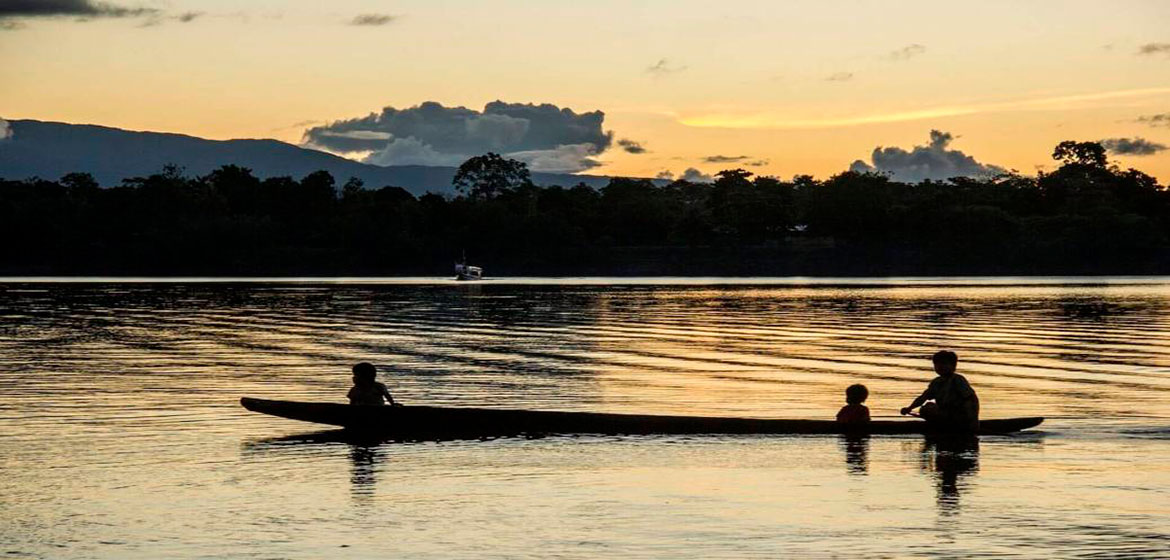by World Resources Institute
The Santa Clara de Uchunya community has lived in a remote section of the Peruvian Amazon for generations. Like many indigenous groups, this community of the Shipibo-Konibo people have traditionally managed and relied on forests for hunting, fishing and natural resources.
But in 2014, someone started cutting down large sections of the community’s ancestral forests.
Without community members’ knowledge or consent, the regional government had given away 200 parcels of land, which were then bought by palm oil company Plantaciones de Pucallpa, part of a foreign group of companies with known and .
Community members turned to indigenous organization for help, but there was a problem: Santa Clara de Uchunya only had formal legal title to a small sliver of their ancestral lands — about (539 acres) out of some (19,800 acres) they occupied.
So in 2015, the community requested an extension of their title to their full ancestral lands. The Regional Government making vague promises and implying that the existence of competing claims to the land made any action impossible. Faced with administrative inaction, the community to compel the government to recognize their constitutional rights to their ancestral land.
The lawsuit remains stuck in the courts, and the community has only been able to obtain a government commitment to a small 750-hectare extension. When officials and community members tried to complete the necessary mapping for this extension, a large crowd, presumably affiliated with the palm oil operations, .
Community members continue to advocate, but they’ve been met with . Unknown came to their homes, making threats like “we are ready to kill.” They beat a community member who refused to leave his land and opened fire on a community delegation trying to gather evidence of deforestation.
Meanwhile, palm oil operations continue, despite ordering a halt to the company’s operations for failing to obtain proper permits and for illegally deforesting at least 5,300 hectares (13,000 acres).
“We never thought that we would have such problems with transnational companies,” said , leader of the Santa Clara de Uchunya community. “We live from hunting, fishing — from the resources that the forest has to offer. Indigenous people without land are nothing.”
Santa Clara de Uchunya’s Struggle for Land Rights Is a Global One
The story of Santa Clara de Uchunya is all too familiar. finds that across 15 countries in Latin America, Africa and Asia, rural communities and Indigenous Peoples face steep challenges to formalizing their land rights. While they wait decades for legal titles that may never come, companies acquire land or begin operations in as little as 30 days (experience the difference in processes through our ). The resulting conflicts over the contested land can last years, displacing communities and creating significant legal and economic risks for companies.

Indigenous Peoples and rural communities occupy of the world’s land, but they legally own just 10 percent of land globally. Obtaining formal land rights is they use to try and protect their land, but our research finds clear inequities in these procedures:
Communities face an uphill battle when trying to obtain formal rights to their land. Many communities do not realize that their customary forms of land ownership lack legal protection; those that do often lack the legal knowledge and resources to begin the process of applying for formal rights. While laws differ by country, land formalization procedures often involve difficult steps like writing technical reports or legal documents. In practice, most communities need help from an outside non-profit organization. Furthermore, as seen with Santa Clara de Uchunya, when conflicts or overlapping land rights and concessions exist, communities may be unable to title their lands at all. We found this to be a key challenge not only in Peru, but also in countries like Indonesia, Tanzania, Guyana and Mozambique.
Even when communities do obtain titles, these documents exclude ancestral lands and natural resources. Santa Clara de Uchunya’s original title was a tiny sliver of their total territory. Many communities similarly have ancestral lands excluded from their titles, with government authorities imposing arbitrary caps on the size of land they grant to communities. Elsewhere, certain types of land cannot be included in titles: in Peru, communities must complete a separate procedure if the government classifies the land as “forestland.” Even then, they can only get a contract to use their land (a cesión en uso), not ownership rights. In practice, only a few communities have been able to obtain this contract.
Some companies take shortcuts when acquiring land, with serious social and environmental consequences. Laws and policies regulating how companies obtain land are sometimes conflicting or inconsistent, leaving loopholes that companies can exploit to acquire land more quickly. Like Plantaciones de Pucallpa, which did not properly complete social and environmental licensing before beginning its operations, some companies take advantage of governments’ limited abilities to monitor for misconduct. This not only hurts communities, but also sets companies that do carefully screen for environmental and social risks at a competitive disadvantage compared to those taking shortcuts.
Getting to the Root of the Land Rights Problem
Investigating environmental crimes and problematic land transactions after they occur comes too late, and is expensive and time-consuming. A far better solution is to solve the land issues at the root of these problems. Governments should recognize indigenous and community land rights, engage in better monitoring of company misconduct during land acquisitions, and ensure that businesses secure the free, prior and informed consent of the people who live on the land before they begin operations.
Source:
Related to SDG 10: Reduced inequalities and SDG 16: Peace, justice and strong institutions



